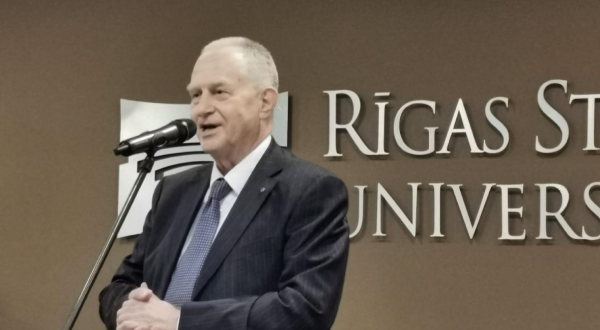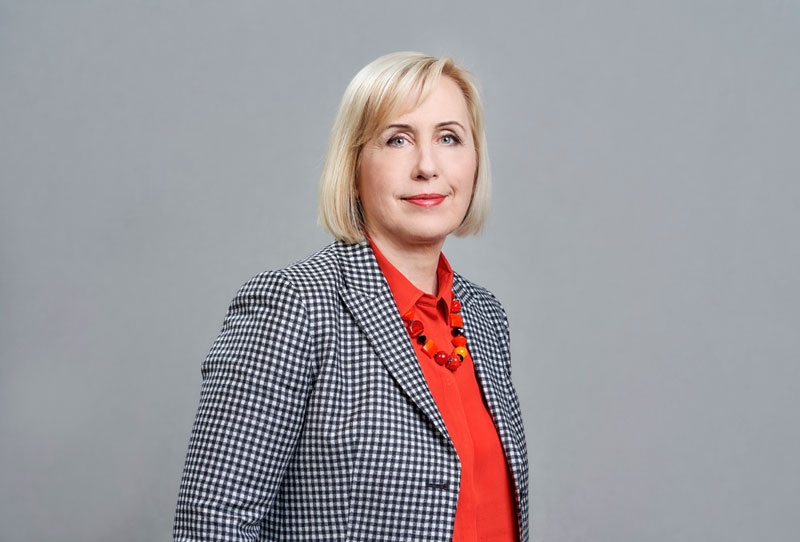Anda Rožukalne: "Our task is to transform students from users into creators"
The Faculty of Communication at RSU was established in 2007 even though communication at Rīga Stradiņš University (RSU) has been taught since 1998. Last year Professor Anda Rožukalne took up the mantle of Chair of the Faculty.
As head of the Department of Communication Studies at the Faculty of Communication and the undergraduate study programme Journalism, Anda Rožukalne has spent 12 productive years working at RSU. In 2009 the professor was the first graduate of the RSU doctoral study programme in social sciences. In anticipation of the 20th anniversary of social sciences at RSU, we approached the Dean inviting her to share her thoughts on changes in the student profile over these years and on future plans of the faculty in the area of studies and research.
The Faculty of Communication is among the newest RSU units – how does it affect the work of your team?
It is characteristic in our faculty that with our work we constantly prove that there is room for dynamic development also in academia – to be up to date with current trends in our field, to experiment with study content and not to be afraid to make mistakes..
While politicians are still hesitant to pass legislation that is fundamental for the development of higher education, academics at the Faculty of Communication have been proactive in enhancing their academic and professional competences, demonstrating that a faculty can be modern within the current legislative framework.
It is very challenging and takes much effort and imagination, but we are always ready for improvement and to learn from mistakes. Because of this I can assert that we employ the best academics in our sector.
I am very grateful to the university management for giving me the opportunity to work independently as we could implement new ideas by developing study programmes and research projects. Being part of Rīga Stradiņš University undoubtedly was an impetus to strive for excellence that has been achieved by the university in medical and healthcare studies.
What is a typical communication student like?
Looking back on my experience and that of my colleagues, I would single out three generations. The first were the experimenters, travelling down an unfamiliar road. They were not afraid to head into the unknown and take up studies in new study programmes that were organised in a completely different way. These were students who knew and were prepared for the fact that during the study process everything may change. It is not surprising that our first graduates launched new projects, founded business enterprises, they were people who wanted to prove themselves and surrounded themselves with like-minded people.
Then came the crisis years and during this period we had students who had experienced the advantages of living in an independent nation – choice, higher expectations, comfort, relationships that were less formal. In their life scenario, life was a captivating adventure to be lived without much effort with the conviction that there is so much time ahead and one should enjoy the moment. I must admit, this was also the time in which the faculty experienced rapid development; we were setting up new programmes and enrolling many students.
The current student generation experienced the consequences of the crisis during their teens. Many families had to reconsider their budgets, many left to work abroad. These circumstances have awoken in them the desire to make this world a better place and therefore the majority of students nowadays are motivated, interested, with a strong inner sense of mission.
Although students change, our approach to the study process remains constant. We know that sooner or later we will all meet up in the same professional environment, therefore we try to facilitate mutual respect and cooperation from the first days of studies.
I strongly believe that there is no need to build up hierarchical pyramids as at some point in our lives the positions can radically change. I strongly support the perception that cooperation and fulfilment of promises must be based on mutual respect, instead of fear. It certainly is not an easy road as students find it difficult to accept such an approach if they take up studies right after secondary school, however, it is more easy at the postgraduate level.
For several years now in the area of higher education there has been much discussion on how to get young people involved in research. What are the possibilities offered to communication students to conduct research?
We have successfully involved our students in the implementation of several projects, for example, the study on values and changes and the impact of the crisis on different areas. Master’s and doctoral students are actively involved in the development of an emotion recognition model.
Discourse on the need to increase research engagement is contradictory. There is pressure from students and policy-makers for us to increase the proportion of practical classes and at the same time the expectation is there that students will actively work on research. How to combine the focus on practical skills and objections regarding the necessity for extensive research options during the study process?
Before we look for a solution, we must accept reality. First, one must understand that the majority of students are not research-oriented and want to demonstrate their expertise in practice. Secondly, students are aware of the limited prospects of research in the area of social sciences in Latvia. Given the circumstances, our task is to encourage our students to switch from being users to creators, teach them to conduct practical research, prior to making decisions, irrespective of the area in which they will work. At the same time we show them interesting research options offered by RSU and encourage them to get involved. This is the moment when we can overcome the hurdle and encourage students to engage in something they have not done before. Afterwards we have the chance to purposefully guide those students on the path of science, whose ambitions and way of thinking are compatible with the distinct nature of the research process.
What is your vision of the future development of the faculty?
We have the potential to set up a dynamic communication and media study centre as there is nothing similar in Latvia yet, and it is possible as we specialise in media communication which can be studied in depth and researched only at RSU. Although the faculty’s programmes cannot offer state-funded study places, we have proven that we are able to develop and offer study programmes worth paying for.
Interdisciplinarity is our strong point – we set up joint study and research projects within the framework of the faculty and in cooperation with our healthcare colleagues, e.g. nutrition and public health experts, psychotherapists. Our objective is to offer unique study programmes that would be competitive in the European market. We have begun the licencing procedure of the postgraduate study programme Health Communication which will also target international students. There are conditions precedent for setting up a media literacy study programme that is currently only offered by a few European universities.
Research is a fundamental development direction. One of the current projects is a glossary of communication terminology which will include old and new terminology used in the study and research process. In conjunction with the RSU Psychosomatic Clinic we are developing the previously mentioned emotion recognition model, combining knowledge in neuroscience, psychiatry and communication.
We understand that we cannot stop at what has been achieved as then we would cease to exist. We are implementing a number of non-academic projects where we prove that we practice what we teach. We constantly expand our curricula, develop the format of final examinations, giving students the possibility to apply the acquired knowledge in practice from the first study year onwards, so the study process is up to date with trends in the communication sector, which is very dynamic.
Related news
 Medicine as the art of mindset and presence: Professor Romans Lācis on the importance of patient dialogueAnniversaries, Interviews
Medicine as the art of mindset and presence: Professor Romans Lācis on the importance of patient dialogueAnniversaries, Interviews



